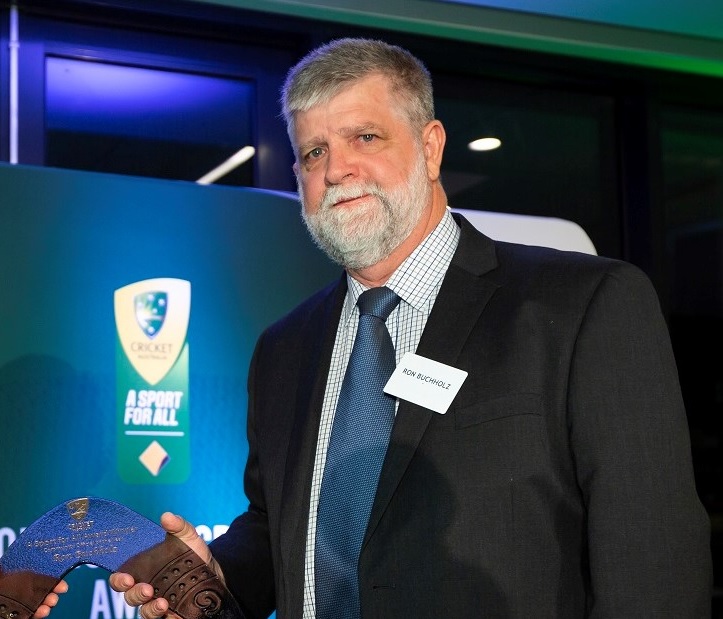My memory of Toowoomba, the bruises and Ron Buchholz
Max Bonnell | May 26, 2023

I drove through Toowoomba last week. And “Toowoomba”, as you know, is an old indigenous expression meaning, “The Place of Painful Memories”.
All right, I made that up. The meaning of the word “Toowoomba” isn’t entirely clear, and it’s the subject of heated debate between people who care about such things, but I’ve got my version, and I’m sticking to it.
It was 1979. I was in a bunch of schoolboys from Sydney on a tour of Queensland, and we were playing a game at Toowoomba. We bowled first, and we felt we were on top – we had the home side seven down for not much more than a hundred. But then, in came the Queensland Schoolboys opening bowler, a strapping farm boy called Ron Buchholz.
Now, we were reasonably serious cricketers and some of us were pretty fit, but none of us looked anything like Ron Buchholz, who looked as though someone had poured a bunch of rocks into a cricket shirt. It wouldn’t have been any surprise to learn that the Buchholzs were closely related to the Schwarzeneggers back in the old country. But he wasn’t just powerful: he was fast. He held just about every sprinting record in the Queensland GPS, and besides his cricket he was a formidable Rugby player. We had a Sri Lankan off-spinner in our side, and Ron decided to see how far he could hit him. Scorers didn’t count the balls the batsmen faced back then, but Ron muscled out 41 runs in only 13 minutes, many of which we spent looking for the ball. We had expected to chase perhaps 120: instead, we faced a target of 181.
But 181 isn’t so many, right? Our openers walked out confidently. Their confidence lasted precisely one delivery. Ron Buchholz, naturally, took the new ball. He ran smoothly towards the crease, accelerating with ease, until his left leg pounded down and his right arm vanished behind his back. He hurled the ball down with a Jeff Thomson-style sling, and the next time any of us saw it was when his keeper tossed it to first slip.
Buchholz would have been considered quick at any level of the game. To schoolboys, in the days before helmets, he was terrifying. Amusing fact: in his last year at school, apart from being Captain of Everything, Ron was awarded something called the Prize for Manliness. Certainly, on this occasion, he was a man among boys. He took the first couple of wickets by knocking stumps out of the ground, and I sat watching with all the smugness of a player who knows that he’s going in at ten, when the spinners will probably be on.
But our coach had other ideas. He walked up to me with a sadistic smile on his face and said, “You’re in next. Pad up.” I tried to explain that the batting order seemed fairly clear to me, and that I was very close to the bottom of it, but he just laughed: “Nah, just hang around for a bit and see if he gets tired.” This was what passed for strategy in our team: send in someone who can’t bat to face the best bowler, so that the guys who can bat have an easier time against the lesser bowlers. But there was no time to argue. The next ball from Ron reared viciously off a length and hit our captain on the glove. The ball flew to second slip, where it was dropped, since it was travelling too fast. It also broke our captain’s thumb, though he didn’t realise it at the time. He just faced up to the next ball, which ripped out his middle stump. I wandered on to the field, still doing up straps and buckles, with the score on 4 for 12.
Probably because I played my school cricket against little medium-pacers on dodgy pitches, my batting was based on playing forward as much as possible – if you played back in our games, the ball tended to hit you on the ankle. This was obviously the worst possible method (you couldn’t really call it a technique) for batting against Ron Buchholz on a fast, bouncy pitch, but I stuck with what I knew. I figured that his dangerous ball was the yorker, because the others would bounce over the stumps, and if I could keep that out I might survive. And so I lunged onto the front foot, and the ball jumped from a good length and hit me in the ribs. The same thing happened next ball, and the one after that. Eventually Ron pitched one up, but it was a touch wide and I let it go. Much the same thing happened the next over, and the one after that, and the one after that. After batting for about half an hour I had collected two runs and 59 bruises. I suppose Ron could have got me out if he’d really wanted, but the fieldsmen seemed to think it was hilarious that I was getting hit seven times in each eight-ball over. By now, though, the basic flaw in our strategy had become apparent: Ron just didn’t get tired.
Eventually, I’d managed to accumulate seven runs, mostly because the guy bowling at the other end served up a juicy half-volley. I swatted that away for three, which was a mistake, because it brought me back to face Ron. At which point, something inexplicable happened. Ron flung down a ball on middle and leg that was a fraction short of a length, and instead of lunging forward, I moved back and across and worked it away off my hip for two runs on the leg side. I have no idea where it came from, but it was an authentic cricket shot, the first I’d played in almost an hour. I was so impressed with myself that I tried to repeat the stroke next ball, in the split second before I realised that this delivery was a bit fuller and a lot faster than the one before, and I’d completely opened myself up to it. Then came the horrible sound of hard leather hitting splintering plastic. Someone carried me off – which, logically, was always how that plan was going to end. We didn’t win. Ron took 7-11. He was very friendly after the game, chatting to us as if we had the right to be on the same field as him, which none of us quite believed.
The day before, we’d seen a young local kid called Craig McDermott bowling at Ipswich, but no-one thought he was a better prospect than Ron. And, for a season or so after that, Ron’s career had exactly the trajectory everyone expected. He was Queensland’s spearhead in the interstate under-19 carnival at the end of the year, taking a hat-trick, and after school he marched straight into First Grade cricket in Brisbane. He looked on track to join that other big German, Carl Rackemann, in the Queensland side. But it turned out that his immense physique had a treacherous weakness, in the form of a dodgy hamstring, and persistent injuries put an end to his chance of advancing in the game.
If that had happened to me, I’d have been bitter – imagine knowing that you could have been exceptionally good at your chosen pursuit, only to have your career destroyed by something beyond your control. But here’s the thing: if Ron was ever resentful, he didn’t show it. He happily played on in country cricket, where he was still good, even if he wasn’t quite what he had been. He was a policeman for a while. Then, when he started a business in Gympie, he became an umpire and a leading local administrator. He coached, he selected teams, he organised, he managed. He just kept giving back to the game that had promised him so much and delivered so little. In 2018, Cricket Australia named him its National Community Official of the Year. Only a few months later, quite unexpectedly, he died suddenly from a heart attack.
Driving through Toowoomba dredges all these memories to the surface. There’s another theory about Toowoomba’s name – that if refers to the two springs that pass by the town. And that works for me, too. Sure, one of the springs is full of painful memories. But the bruises faded, in time, and running through the second spring is a reminder that there’s a path through disappointment that doesn’t have to end in bitterness and regret.








